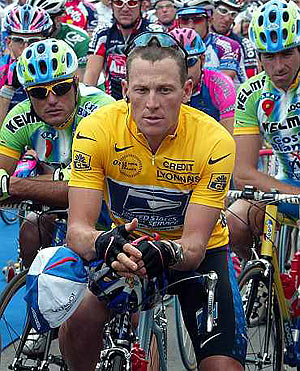Federal prosecutors on Friday dropped an investigation centred on whether seven-time Tour De France champion Lance Armstrong and his teammates cheated the sponsor of their bike racing team with a secret doping program.
 US Attorney Andre Birotte Jr, in a brief written statement, did not detail the nature of the probe -- saying simply that his office was "closing an investigation into members and associates of a bicycle racing team owned in part by Lance Armstrong."
US Attorney Andre Birotte Jr, in a brief written statement, did not detail the nature of the probe -- saying simply that his office was "closing an investigation into members and associates of a bicycle racing team owned in part by Lance Armstrong."
A source familiar with the investigation, however, said prosecutors had been looking into whether the team had defrauded its sponsor, the US Postal Service, by doping. Doping, or using performance enhancing substances in sports, itself is not a federal crime.
"The US Attorney determined that a public announcement concerning the closing of the investigation was warranted by numerous reports about the investigation in media circles around the world," Birotte said in the statement.
"This is great news. Lance is pleased that the United States Attorney made the right decision, and he is more determined that ever to devote his time and energy to Livestrong and to the causes that have defined his career," Armstrong's attorney, Mark Fabiani, said in a brief written statement.
Despite unparallelled success as a cyclist, Armstrong has never been able to shake allegations he was a drug cheat.
Rumors have spread for years that Armstrong, who retired last year, used performance-enhancing drugs to fuel his brilliant career.
The seven-time Tour de France winner, a cancer survivor who has never failed a doping test, has vehemently and repeatedly denied the accusations.
FLOYD LANDIS ACCUSATIONS
Former teammate and deposed Tour de France winner Floyd Landis in 2010 accused Armstrong not only of using performance-enhancing drugs but teaching others how to avoid being caught.
Landis said he witnessed some of his teammates, including Armstrong, use illegal drugs, including once on a team bus during a race, to boost performance and endurance.
The wife of one-time Armstrong teammate Frankie Andreu has also said that Armstrong admitted to using illegal drugs.
In a sworn deposition, Betsy Andreu said Armstrong, when asked by doctors at Indiana University Medical Center whether he had used performance-enhancing drugs, replied yes and listed EPO, growth hormone, cortisone, steroids and testosterone, Sports Illustrated reported.
Armstrong also has had ties to controversial Italian doctor Michele Ferrari, who has publicly defended the use of EPO but has denied helping athletes enhance performance through doping.
The United States Anti-Doping Agency previously said it has tested Armstrong 27 times since 2001, adding that the totals do not include tests done by international organisations.
Earlier accusations that the American had used EPO during the 1999 Tour de France led to a 2006 investigation supported by the International Cycling Union (UCI) that cleared Armstrong of doping.
The investigation followed allegations published by the French newspaper L'Equipe that six of his urine samples from the 1999 Tour showed traces of EPO
USADA chief Travis Tygart said in a written statement on Friday that its investigation into cycling was still ongoing.
"Unlike the US Attorney, USADA's job is to protect clean sport rather than enforce specific criminal laws," Tygart said in the statement.
"Our investigation into doping in the sport of cycling is continuing and we look forward to obtaining the information developed during the federal investigation," he said.








 © 2025
© 2025